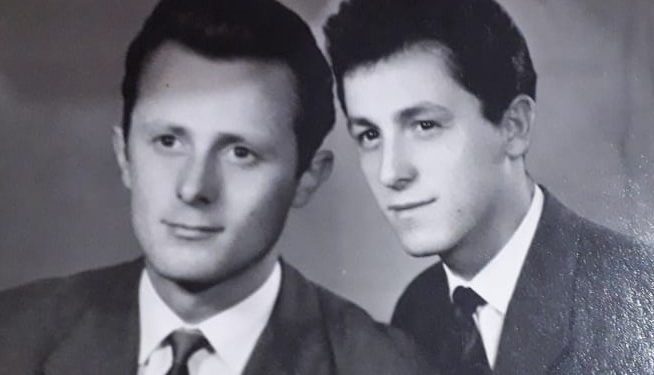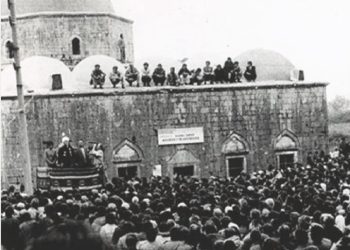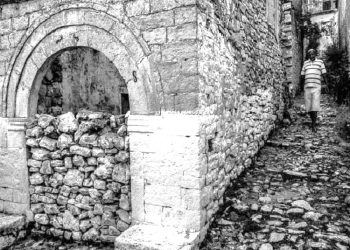By Gjergj Angoni
Memorie.al/ Our brother, Pirro Angoni, was born on April 16, 1942, in the village of Progër in the province of Devoll, where at that time his father, Fahredin Myrteza Angoni, was appointed as a Chief Teacher. Based on this, he spent his childhood for two years in Progër and then together with his family, they finally moved to the city of Korça. At the age of four, Pirro was left an orphan, after our father was shot by the communists with the order and direct interest of dictator Enver Hoxha, whom his father had been a citizen of in the city of Gjirokastra, where our family comes from and also a schoolmate. at the French Lyceum, in the city of Korça, where for more than a year, Enver lived in the rented house of our grandfather by his mother, Praksithe Shahini.
Pirrua felt his father’s shooting, as well as our whole family, very much, because after that, he continued to grow up without his care and caresses, without the stories and tales he told him, whenever he put him to sleep. There was no day, winter or summer, left in the hours when his father, Fahredin, was coming home from work, so that Pirroja would not go out the door and sit on the sofa of the house, to wait for him! He continued this habit for a long time and after his father was shot! One day when it was very cold, Jovanica, a neighbor of ours, saw Pyrrhus sitting on the icy sofa and, from the pain he felt for him, rebuked him:
– “You are entering inside, son, because you have become cold from the cold, enter inside”.
– “No ‘said Pirrua,’ I do not enter because I am waiting for my father to come from work…”, and Jovanica’s eyes filled with tears and not to give himself in front of the little Pirro who was waiting for his father, who did not never came back, immediately rushed inside sighing! So much so that Pirrua felt the absence of his father. When he grew up, Pirro went to primary and 7-year school, and then enrolled in high school, at the ‘Pedagogical’ School, which he completed in Korça. After graduating from high school, where he graduated with honors, he was appointed a teacher in the village of Vërzhezhë, Skrapar district, where he worked diligently for several years, teaching various subjects.
In that district, in addition to his contribution to the education of the younger generation with the honorable profession of teacher, Pirro also participated in all artistic and sports activities of the Skrapar district, where he especially contributed to the football team, which was then called “September 5 ”. After serving there for several years, he was transferred from Skrapar to the district of Pogradec, in the mountainous area of Mokra, in the village of Slabinje. In 1976, she and our sister, also teachers, were expelled from education, with the motivation: “undesirable for the education of the younger generation”, which came as a result of the aggravation of the infamous class war.
Given the fact that Pirro had not yet completed compulsory military service, we as a family thought that after retiring from education even though he was at a relatively old age, he should do the army and then when he was released, with the mind of sleeping, to try to find her a job, as we did with our sister, (Lirika), who started working as a manual worker in the Carpet Factory here in Korça.
At that time, our uncle was organized (as the members of the Albanian Labor Party were otherwise called) and worked as an accountant, in a military unit and as such, he had friends in the army and based on this, he was he was interested in arranging his nephew, Pirron, in a good military unit and as close as possible to the city of Korça.
Uncle’s friends in the Military Branch, knowing that he was his nephew, but without knowing the biography of our family (that we had a father shot by the Party), sent Pirro to a three-year ward, to the ‘Locators’ who was located at Kodra e Zogut in the city of Durrës. That ward was quite ‘comfortable’, especially for a soldier who came from Korça and was near the sea and inside the city, but it was also a delicate place, as it required in the first place, “political guarantees”.
Only two months later, one of his comrades, who were in the army with Pirro, I reported him to the command for the biography work, and after that, it was not long before Pirro was removed from that ward and sent as a “declassed soldier”. ”In a work ward. This action was quite serious, not only for Pyrrhus, but also for us, but we had nothing to do, that was our destiny! We had the “evil inside” and above all, it had to do with the infamous class struggle, which was hammering us on the head, in every step of our lives.
Two years later, when Pyrrhus’s soldiers were to be released, he was told he had to stay another year, on the pretext that when he had been mobilized, he had been sent to a three-year ward. The situation for Pyrrhus worsened and upset him greatly. Anyone who has made the army, especially in difficult conditions, such as the labor units, understands very well the situation in which Pirro found himself at that time, when he was waiting for the release day by day, to be told that: stay and another year soldier! That was awful!
Based on this situation, after a telegram addressed to the then Minister of Defense, Beqir Balluku, where we clearly explained the situation, after a month Pirro was released.
After his release from the army, not only could Pirro not return to education, but despite our best efforts as family and relatives, he barely secured a worksheet to work as a laborer in the State Construction Company. in the district of Korça. After that, with the mediation of a friend, he joined the group of plumbers and also continued high school at night, without separation (Mechanical branch), and after four years, while working as a plumber, as a diploma, defended the topic ‘City heating, with energy benefited from TEC’.
This topic that Pirro defended brilliantly in a commission set up apostates on the problem of heating the city, using the energy of TEC and won the title “Master” in the profession of plumber and continued to work in various enterprises and works of ” five-year-olds ”. Thus, in the works for the construction of the water supply in the area of Pojan, to save the comrades and some employees of the area, he risked himself, being burned in the third degree, for which the doctors did not give him hope! But, thanks to the professionalism and humanism of a nurse, of the combustion ward, who cured him for several months, he saved his life. Meanwhile, although Pirro was burned and risked his life, to save his co-workers, by the state or the enterprise where he worked, no interest, no care and no reward or gratitude was shown, for his act that saved the lives of so many people!
After the fall of the communist regime, in the early 1990s, Pirro and all of us as a family engaged in the democratic process, but he especially made a major contribution to the overthrow of communism (not yet overthrown) and the victory of democracy in Albania, becoming a valuable example, both by the Association of Political Prisoners and Persecuted of Albania (Korça branch), but also by various relevant party and state structures in Tirana.
Based on this contribution of his, after the democratic changes, he served in the Green Cleaning Enterprise in the city of Korça, (in the position of head of that sector) giving a contribution to the beautification of the city. As a result, he was praised by the citizens of Korça and, among other things, for the construction of two large fountains in the central square of the city.
Later, Pirro served as an inspector at the Vocational School of Korça District, in the branch of Hydraulics, where he retired. Our brother, Pirro, passed away on July 22, 2021, from a serious and incurable disease, leaving behind his wife, two children (daughter and son), as well as four grandchildren.
In addition to these, Pirrua went quietly into that world, because, together with us other family members, in the early 90s, after a great ordeal and many vicissitudes, we made it possible to find the bones of his father our beloved, Fahredin Myrteza Angoni, for whom he (Pirro), had a not insignificant role. /Memorie.al














